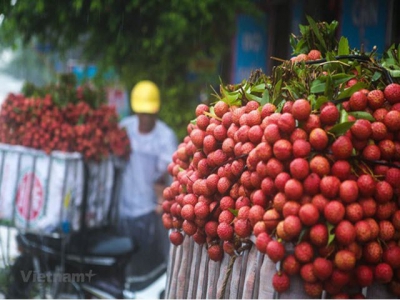Japans decision opens new doors for Vietnamese thieu lychee

Tokyo – Japan’s recent decision of importing Vietnamese “thieu” lychee is expected to open new doors for this fruit, according to Vietnamese Trade Counsellor in Japan Ta Duc Minh.
“Thieu” lychee is Vietnam’s fourth fresh fruit licensed to be exported to Japan after dragon fruit, mango and banana. (Photo: VNA)
“Thieu” lychee is Vietnam’s fourth fresh fruit licensed to be exported to Japan after dragon fruit, mango and banana, Minh told the Vietnam News Agency correspondents in Japan on January 9.
Since Japan is one of the choosiest markets in the world with strict food safety and hygiene standards, the presence of Vietnamese fresh lychee in the market will help widen doors to export to other developed countries, Minh said.
To make good use of this opportunity, Minh advised businesses to strictly abide by Japan’s quarantine regulations and standards on food hygiene and safety.
Fruit exporters must pay special attention to the quarantine stage because any batches of lychee with pesticide residues exceeding the Japanese regulation will be returned or destroyed, he said.
He suggested applying advanced preservation technology to keep the lychee fresh longer.
In December 2019, the Ministry of Agriculture, Forestry and Fisheries of Japan (MAFF) sent a letter to the Plant Protection Department of Vietnam’s Ministry of Agriculture and Rural Development saying to open door for Vietnamese “thieu” lychee.
This is the result of more than five years of negotiation efforts between the Vietnamese Plant Protection Department and the MAFF.
The letter was enclosed with regulations on imported plant quarantine for Vietnamese lychee, which took effect from December 15, 2019.
Accordingly, Vietnamese lychee exported to Japan must be grown in gardens supervised and granted area codes by the Plant Protection Department, and comply with Japan’s regulations on plant quarantine and food safety.
Exported batches must be packed and treated with Methyl Bromide at facilities recognised by the Plant Protection Department and the MAFF with the minimum dosage of 32g/m3 for two hours under the supervision of Vietnamese and Japanese plant quarantine officers.
They must be enclosed with a phytosanitary certificate issued by the Plant Protection Department.
Related news
 182 rice traders certified as eligible for rice exports
182 rice traders certified as eligible for rice exports The Ministry of Industry and Trade has granted 47 certificates of eligibility to rice export businesses over the past year, lifting the number of rice exporters
 Digital transformation key driver for agriculture
Digital transformation key driver for agriculture The digital transformation is being considered the key to unlock sustainable development of livestock for the country, with large-scale breeding farms investing
 A gloomy year of rice exports
A gloomy year of rice exports Throughout the year, rice exports faced many difficulties with decreasing export value compared to the same period last year.